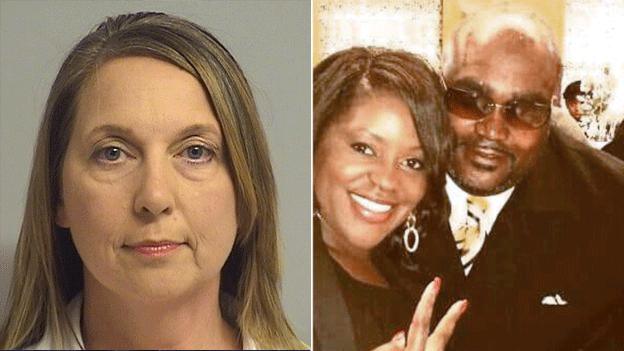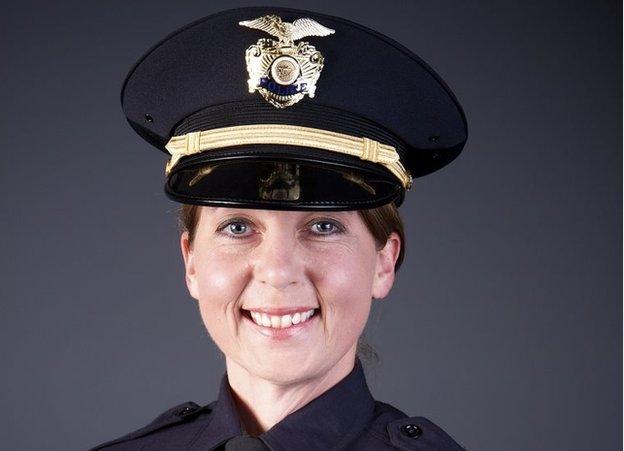Tulsa Officer Betty Shelby opened fire in 'heat of passion'
- Published

Officer Betty Shelby (L) shot and killed Terence Crutcher, pictured with his twin sister
An Oklahoma police officer has been charged with first-degree manslaughter "in the heat of passion" over the fatal shooting of a black motorist.
Tulsa officer Betty Shelby was booked into the county jail early on Friday and released minutes later on bail.
Prosecutors say she "reacted unreasonably" when she killed 40-year-old Terence Crutcher on 16 September.
North Carolina police, meanwhile, are under mounting pressure to release video from another fatal shooting.
Tulsa has been spared the unrest seen in the city of Charlotte this week after a black policeman shot a black citizen.
Congressman Robert Pittenger tells BBC Newsnight: 'They hate white people because white people are successful'
The Tulsa County affidavit, filed with the charge against Officer Shelby, accuses her of "escalating the situation from a confrontation with Mr Crutcher".
Mr Crutcher died from "a penetrating gunshot wound of chest" and his death was ruled a homicide, according to the Oklahoma State Medical Examiner's Office.
Officer Shelby is charged with "becoming emotionally involved to the point that she over reacted", according to Thursday's court document.
Oklahoma law defines "heat of passion" in manslaughter cases as a strong emotion "that would naturally affect the ability to reason and render the mind incapable of cool reflection".
If convicted, she faces a minimum of four years in prison.
Officer Shelby posted a $50,000 (£38,000) bond and was released at 01:31 (05:31 GMT) on Friday, minutes after arriving for a booking photo, according to jail records.
The affidavit says she told homicide investigators "she was in fear for her life and thought Mr Crutcher was going to kill her".
"When she began following Mr Crutcher to the vehicle with her duty weapon drawn, she was yelling for him to stop and get on his knees repeatedly," it says.
'Police didn't give my brother a chance' - Tulsa victim's sister
The affidavit says Mr Crutcher was not responding to Officer Shelby's verbal commands and was walking away from her with his hands held up.
Prosecutors say Officer Shelby either killed the father-of-four impulsively in a fit of anger, or that she wrongly killed him as she sought to detain him.
Police acknowledge that Mr Crutcher did not have a gun on him or in his vehicle.
The affidavit also indicates that Officer Shelby "cleared the driver's side front" of Mr Crutcher's vehicle before she began interacting with him.
This would indicate she had checked whether there was a gun on the driver's side of the vehicle.

Officer Shelby joined the Tulsa Police Department in December 2011
Mr Crutcher's twin sister, Tiffany Crutcher, said her family welcomed the charge.
Attorney Damario Solomon-Simmons said: "We are happy that charges were brought, but let me clear - the family wants and deserves full justice."
Dashcam and aerial footage does not offer a clear view of the moment Officer Shelby fired the single shot that killed Mr Crutcher.
President Obama's advice to protesters and reformers
Her lawyer has said she opened fire when Mr Crutcher began to reach into his vehicle window.
But the Crutcher family lawyers say enhanced video from a police helicopter shows the vehicle's window was closed.
Officer Shelby encountered Mr Crutcher's vehicle on a city street, straddling the centre line, as she made her way to a domestic violence call.
Police say a vial of the drug PCP was found in the vehicle.
The shooting followed a long history of troubled race relations in Tulsa, dating to the city's 1921 race riot that left about 300 black residents dead.

Millennials worry about what's in store for the next generation of black Americans